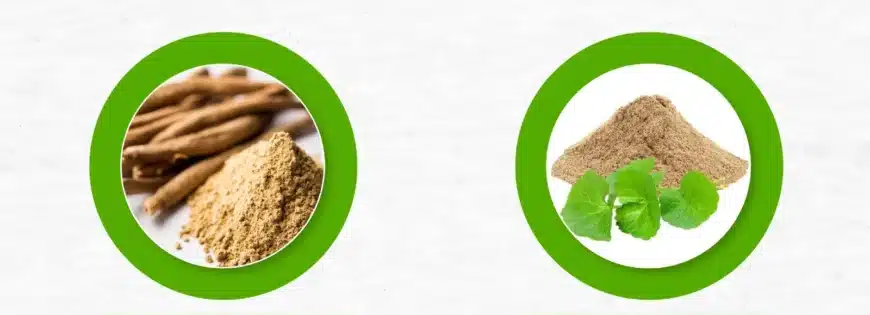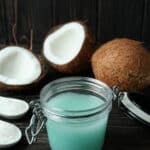In the realm of natural remedies, adaptogenic herbs have garnered significant attention for their potential to assist the body in coping with stress and maintaining balance. Among these botanical wonders, Ashwagandha and Bacopa stand out for their extensive historical use and scientifically supported benefits. This comprehensive article delves into these two powerful adaptogens’ properties, advantages, differences, and considerations.
Understanding Ashwagandha:
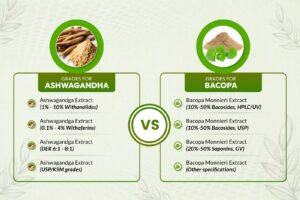
Botanical Name– Withania somnifera
Plant Parts Used– Roots, Leaves, Whole Plant
Active Constituents– Withanolides
Ashwagandha, scientifically known as Withania somnifera or Winter Cherry, is an evergreen shrub native to regions of India, Africa, and the Middle East. With a history in Ayurvedic medicine spanning thousands of years, Ashwagandha has been revered for its ability to promote relaxation, alleviate stress and anxiety, enhance cognitive function, and boost vitality.
Also Read: Standardized Botanical Extracts
The primary bioactive components of Ashwagandha are withanolides, with withaferin A and withanolide D being the most notable. These compounds contribute to Ashwagandha’s myriad health benefits, including stress reduction, improved sleep quality, enhanced cognitive abilities, and support for thyroid function and reproductive health.1
Benefits of Ashwagandha:
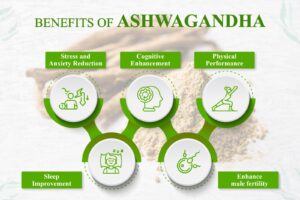
1. Stress and Anxiety Reduction: Ashwagandha is renowned for its stress-relieving properties, attributed to its ability to lower cortisol levels and promote a state of calmness and relaxation. 2
2. Cognitive Enhancement: Studies have demonstrated Ashwagandha’s potential to improve cognitive function, including memory, focus, and mental clarity.
The 2021 study investigated the effects of Ashwagandha root extract on cognitive functions, stress levels, and sleep quality in stressed adults. Conducted as a randomized, double-anonymized, placebo-controlled trial, 130 healthy participants experiencing stress were assigned to either receive Ashwagandha capsules or placebos for 90 days.
The study aimed to assess changes in cognitive function, stress levels, sleep quality, and psychological well-being. Results indicated significant improvements in recall memory and reduced error rates in memory tasks among the Ashwagandha group compared to the placebo. Additionally, participants taking Ashwagandha reported lower perceived stress levels, improved sleep quality, and higher psychological well-being. No adverse effects were reported, suggesting Ashwagandha’s safety and tolerability.
These findings highlight the potential of Ashwagandha as a natural remedy for managing stress-related issues and enhancing cognitive health, but further research is needed to validate these results and understand the underlying mechanisms. 2
3. Physical Performance: Ashwagandha has been shown to enhance physical performance, making it popular among athletes and fitness enthusiasts.
The study examined the impact of ashwagandha root extract consumption on muscle mass and strength in healthy young men in resistance training. In an 8-week, randomized, double-blind, placebo-controlled trial, 57 male subjects were divided into treatment and placebo groups.
The treatment group received 300 mg of ashwagandha root extract twice daily, while the control group received starch placebos. After 8 weeks of resistance training, the ashwagandha group exhibited significantly greater increases in muscle strength and muscle size at the arms and chest, a reduction in exercise-induced muscle damage, an increase in testosterone levels, and a decrease in body fat percentage compared to the placebo group.
The study concludes that ashwagandha supplementation may be beneficial in enhancing muscle mass and strength in conjunction with resistance training. 3
4. Sleep Improvement: Ashwagandha may help with better sleep. A study was conducted to evaluate the pharmacological effects of Ashwagandha root extract on sleep in both healthy individuals and those suffering from insomnia. In a double-blind, randomized, placebo-controlled trial, 80 participants were assigned to either the Ashwagandha or placebo group and studied over 8 weeks.
The assessment included sleep parameters, the Pittsburgh Sleep Quality Index, the Hamilton Anxiety Scale, mental alertness, and safety evaluations. Results showed significant improvement in sleep parameters for healthy and insomnia subjects supplemented with Ashwagandha, with more remarkable improvement observed in insomnia patients. The analysis confirmed significant enhancements in sleep onset latency, sleep efficiency, total sleep time, and wake-after-sleep onset for the Ashwagandha group.
The study concluded that Ashwagandha root extract effectively improves sleep quality and may aid in managing insomnia, with well-tolerated effects across participants. Further clinical trials are recommended to validate these findings. 4
5. Enhance male fertility: Ashwandandha may help in enhancing male fertility. The research focused on evaluating the efficacy and safety of Withania somnifera (Indian ginseng) treatment in infertile men was conducted. Through a systematic review and meta-analysis of published literature, including clinical trials and observational studies, the study aimed to assess the impact of W. somnifera on sperm parameters, hormonal profile, oxidative biomarkers, and pregnancy outcomes in men with infertility issues.
The included studies demonstrated significant improvements in sperm concentration, semen volume, sperm motility, and hormonal levels following W. somnifera treatment. Additionally, no adverse effects were reported. However, due to the limited number of eligible studies, further high-quality randomized controlled trials with larger sample sizes are needed to strengthen the evidence supporting the use of W. somnifera in male infertility treatment.
Further research is required to understand the molecular mechanisms underlying Ashwagandha’s effects on male fertility. 5
Exploring Bacopa Monnieri:
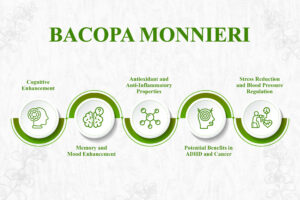
Botanical Name– Bacopa monnieri
Plant Parts Used– Aerial Part
Active Constituents– Bacosides
Bacopa monnieri, commonly known as Brahmi, is a revered Ayurvedic medicine herb celebrated for its cognitive-enhancing and stress-alleviating properties. This perennial herb, native to wet, tropical regions, including India and Southeast Asia, has a rich history spanning over 3,000 years in traditional medicinal practices. 6
Modern scientific exploration has delved into the potential benefits of Bacopa monnieri, revealing promising results across several domains:
1. Cognitive Enhancement: Research suggests that Bacopa monnieri may improve memory, learning, and information processing. Studies on older adults undergoing cognitive training have shown improvements in cognitive tasks, mood, and memory recall. 6
2. Memory and Mood Enhancement: Bacopa monnieri has demonstrated memory enhancement and mood stabilization effects, particularly in older adults. Participants showed improved memory scores and reduced feelings of depression and anxiety after supplementation. 6
3. Antioxidant and Anti-Inflammatory Properties: Bacopa monnieri contains potent bacosides, which neutralize free radicals and prevent oxidative damage associated with neurodegenerative conditions. Additionally, it exhibits anti-inflammatory effects by suppressing pro-inflammatory cytokines and enzymes, potentially relieving inflammation and pain. 6
4. Potential Benefits in ADHD and Cancer: Preliminary studies suggest Bacopa monnieri’s efficacy in reducing symptoms of Attention Deficit Hyperactivity Disorder (ADHD) and inhibiting the growth of cancer cells, indicating its potential in managing these conditions. 6
5. Stress Reduction and Blood Pressure Regulation: Bacopa monnieri acts as an adaptogen, enhancing the body’s resistance to stress and potentially regulating blood pressure levels by improving blood vessel dilation. 6
Differences Between Ashwagandha and Bacopa
While Ashwagandha and Bacopa share similarities in their adaptogenic nature and ability to promote stress relief and cognitive enhancement, they exhibit differences in their primary benefits and mechanisms of action.
1. Health Differences: While both can deal with stress, sleep issues, and cognitive health, Ashwagandha is favored for its stress-relieving and sleep-enhancing properties, while Bacopa is renowned for its mental benefits and memory enhancement. 7 8 9
2. Cognitive Function: Ashwagandha indirectly supports cognitive function through stress reduction, whereas Bacopa directly enhances cognitive abilities and memory. 8 10 11
Also Read: The Health Benefits of Holy Basil
3. Sleep Improvement: Ashwagandha is known to calm you down and reduce stress, which can help you sleep better. Some studies have shown that it can help you sleep deeper and wake up less during the night, giving you more restful sleep.
Bacopa is mainly used for improving memory and reducing anxiety, which might indirectly help with sleep. However, it’s not commonly used specifically for sleep, and there needs to be more research on how it directly affects sleep, as Ashwagandha does. So, if you’re looking for something to help you sleep better, Ashwagandha might be the way to go. 12 13
4. Hormone Balance: Ashwagandha has been studied extensively for its positive effects on the endocrine system, especially on the adrenal and thyroid glands. It can lower cortisol levels, the body’s primary stress hormone, and increase thyroid hormone levels, which is helpful for people with low thyroid function. Additionally, Ashwagandha can boost testosterone levels in men, supporting reproductive health.
On the other hand, there is less research on Bacopa’s effects on hormonal health. Some studies suggest it might lower cortisol levels and increase thyroid hormone levels, but more research is needed to understand its impact on hormones compared to Ashwagandha. 5 14
Safety Considerations:
Both Ashwagandha and Bacopa are generally safe when used appropriately, but they may interact with certain medications and may not be suitable for everyone. Consultation with a healthcare provider is essential before initiating any new supplement regimen, especially for pregnant or breastfeeding individuals, those with pre-existing health conditions, or those taking medications.
Ashwagandha and Bacopa exemplify the potential of adaptogenic herbs in supporting overall well-being, particularly in managing stress, enhancing cognitive function, and promoting vitality. While each herb offers unique benefits, their combined use can provide comprehensive support for the mind and body. With proper guidance and consideration of individual health needs, Ashwagandha and Bacopa can serve as valuable allies in navigating the challenges of modern life, helping individuals achieve balance and resilience in the face of stressors.
Note: While the information provided is based on credible references, we do not make any specific claims or guarantees. It is important to consult with your healthcare advisor for personalized advice and guidance related to your health.



